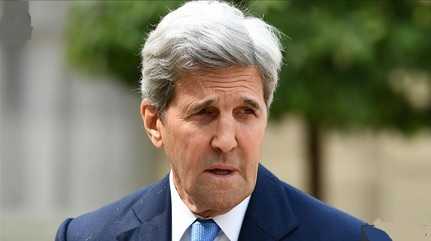
BEIJING (AP) — U.S. Special Presidential Envoy for Climate John Kerry will travel to Beijing next week to discuss strategies for limiting global warming, amid a push by the world’s two largest economies to reengage on multiple issues following a sharp decline in contacts.
Kerry’s office said he will arrive Sunday and depart July 19. He is due to meet with his counterpart Xie Zhenhua, with whom he has established a strong working relationship.
“During meetings with PRC officials, Secretary Kerry aims to engage with the PRC on addressing the climate crisis, including with respect to increasing implementation and ambition and promoting a successful COP28,” Kerry’s office said in a press release, referring to China’s formal title, the People’s Republic of China, and the UN Climate Change Conference scheduled to be held in the United Arab Emirates in November and December.
Kerry’s visit comes on the heels of one by Treasury Secretary Janet Yellen, who appealed to China on Saturday for cooperation on climate change and other global challenges and not to let disagreements about trade and other irritants derail relations.
In a meeting with her Chinese counterpart, Vice Premier He Lifeng, Yellen defended U.S. restrictions on technology exports that rankle Beijing. She said the two governments shouldn’t let such disagreements disrupt thriving economic and financial relations.
During a visit last month, U.S. Secretary of State Antony Blinken met with Chinese President Xi Jinping and said they agreed to “stabilize” badly deteriorated U.S.-China ties, but America’s top diplomat left Beijing with his biggest ask rebuffed: better communications between their militaries.
After meeting Xi, Blinken said China is not ready to resume military-to-military contacts, something the U.S. considers crucial to avoid miscalculation and conflict, particularly over Taiwan, the self-ruled island democracy claimed by China as part of its territory.
The visits by U.S. officials are part of efforts to revive relations that are at their lowest level in decades due to disputes over trade, technology and regional security.
Beijing broke off climate discussions with Washington last August in retaliation for a visit by then-Speaker Nancy Pelosi of the House of Representatives to Taiwan.
Kerry has said China needs to step up its carbon reduction targets that now have it hitting peak output in 2030 and becoming carbon neutral in 2060. The country is currently the top emitter of fossil fuels, owing partly to its continued operation and building of coal-fired power plants.
Xi’s government has resisted pressure to rapidly phase out coal plants, arguing that China is still a developing nation and should not be held to the same climate standards as the U.S. and other big Western economies.




